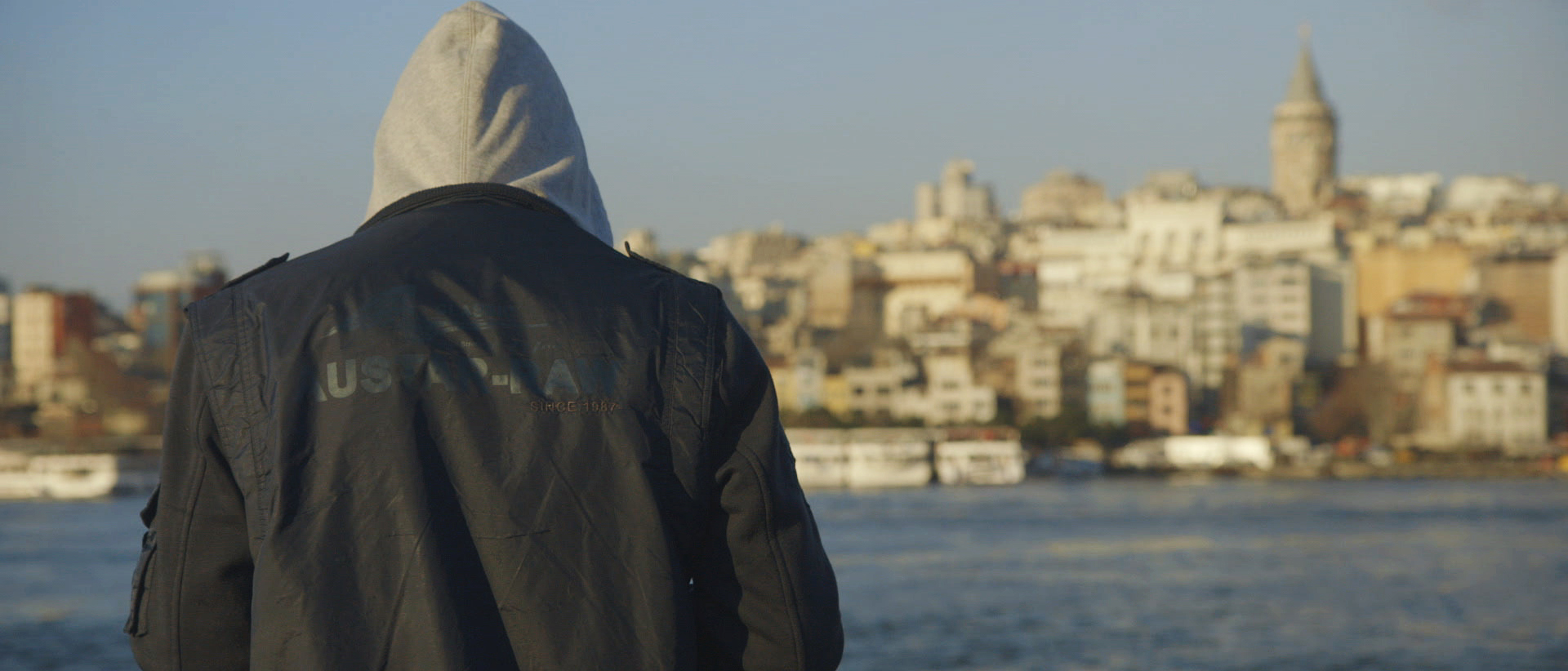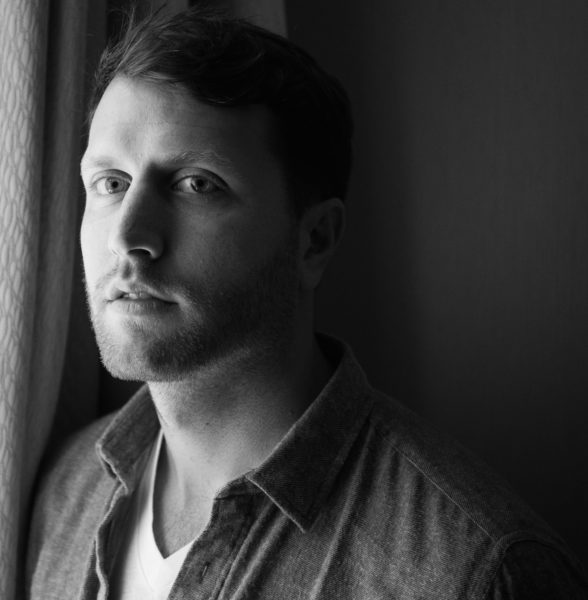Sign up for the daily CJR newsletter.
Matthew Heineman has a reputation for fearless filmmaking. His 2015 documentary, Cartel Land, about American and Mexican vigilante groups fighting drug cartels along the US-Mexican border, features stomach-churning examples of Heineman putting himself in danger to film extreme close-ups of shootouts and other menacing encounters.
His upcoming documentary, City of Ghosts, tells the story of the citizen journalists behind Syrian news website Raqqa is Being Slaughtered Silently (RBSS), who risk their lives to document the atrocities perpetrated by ISIS in their hometown. The northern Syrian city has become the de-facto capital of ISIS since the group took control in early 2014, imposing strict rules on dress and behavior and punishing transgressions with public executions. After learning about RBSS from a November 2015 New Yorker story by David Remnick, Heineman reached out to the group. Soon after, he began filming the efforts of those members who had left Syria—in the face of death threats and an internet blackout—to ensure the recordings of members on the inside got out.
Harrowing scenes show the exiled group watching and rewatching the targeted killings of loved ones, filmed and then disseminated through ISIS propaganda channels with the aim of scaring RBSS journalists into silence. Heineman captures a confrontation with anti-refugee activists in Germany, and their response to the news that ISIS operatives may have tracked them down there. With shocking clarity, the film makes the abstract noise and chaos of the battle against ISIS personal through the stories of some of those most vulnerable to its vicissitudes.
The result is an important and moving film that crystallizes the purpose and power of journalism, the courage and the sacrifice of those fighting to get the truth out, and the human impact of a war being waged across the ocean. Heineman spoke with CJR about his experience making the film, the work of RBSS, and the battle between truth and ideology unfolding on social media. This interview has been edited for length and clarity.
One of my goals was to put a human face on these topics, to allow you to go on this emotional, visceral journey, and I think people have been responding to that.”
RELATED: As bombs rain, freelancers build their own bunker
What was your thinking and purpose in making this documentary?
I think intellectually I was fascinated by this media war, this war of information that was being waged between ISIS on one hand and Raqqa is Being Slaughtered Silently on the other. That was my intellectual motivation to make the film. But as with most of the films that I make, being open to the story changing is key, so for me the story became many more things. It became an immigrant story, it became a story about finding oneself in a new land, it became a story of rising nationalism in Europe, it became a story of trauma and the effects of trauma. It became much more than what I initially started out making.
How long were you filming with RBSS for?
I filmed with them for about nine months, [on and off]. Again, I knew that I wanted the spine of the story to be this exodus as they were fleeing from Syria to Turkey, and from Turkey to Europe, escaping ISIS after members of RBSS were killed. I knew that I also wanted to cut back and forth to the amazing footage they had filmed and continued to film from within Raqqa.
You must have had to watch a lot of footage, much of it quite gruesome. What impact did that have on you?
To make the film we went through hours and hours and hours—I mean hundreds of hours—of footage that RBSS had accumulated and smuggled out of Raqqa. And also ISIS videos themselves, of which I think we had well over 500 hours of content that we were sifting through. Obviously, that has an effect on you, but it’s nothing compared to what these guys go through every single day, and all the trauma they’ve been through.
The portrayal of violence in the film was something we debated and argued about and discussed [in] every single frame, every single moment, oftentimes for days or weeks, about how much to show and how much not to show. My goal in the types of films I make is to really transport the audience into a world that they could not otherwise go to, and to meet characters they might not otherwise get to meet. I think that’s one of the values of documentary films. One of the things I wanted to do is transport you into Raqqa to make you feel what life is like there, and part of that is the horrific violence and fear with which citizens live, and especially these citizen journalists who are exposing what ISIS is doing, who are in extraordinary danger trying to capture these images. To not show this violence would not do justice to their struggle and to what they and their family members live with. But, on the other hand, we didn’t want to make people run out of the theater, or turn off their TV, or however they’re viewing the film. We very much tried to strike a balance between those two opposing forces.
Is RBSS still doing this work?
The dynamic as you saw it, it’s still the same, with members of the group on the inside and then members of the group on the outside—who you meet in the film—receiving the information, and disseminating it to the world.
Was there any trepidation on the part of members of RBSS about being on camera and putting themselves out there so publicly?
We had many conversations along the way about the ramifications of taking part in the film. The ramifications both in terms of production—how, when, and where we filmed—but also the implications of [the fact that] once the film comes out into the world, their profile would most likely increase. These were things we talked about and that we were very forthright about. But at the end of the day, they wanted this film to be made and they gave me the access I needed to tell the story in the way I wanted to tell it. I think they came to the conclusion that, to some degree, the film was an extension of their work, but also that they didn’t want to continue to hide behind the veneer of social media. They wanted the world to know there were moderate Muslim men from Raqqa who were real people with families, who laughed, and who had a sense of brotherhood and camaraderie with their friends, to humanize their experience. That was my approach, and I think that’s something they were excited about even though it might put them at greater risk. I think, especially the members on the outside, who are the ones I spent time with, felt that risk was worth it.
Are you still in touch with them? What do they think of the film?
They’ve all seen the film. I think they’re proud of [it] and they’re happy they took part in it. It’s being released this summer, so we’ll see what kind of reactions it gets once it’s available worldwide. Right now it’s only been press screenings and festivals. They’ve been traveling around with the film. They were at Sundance for the premiere, they were at Tribeca for the New York premiere.
What has the reception been so far?
I think people are very moved by the film. I feel like oftentimes these large issues—ISIS, Syria—get relegated to headlines, or to photos, or to stats. One of my goals, I guess, going back to your original question, was to put a human face on these topics, to allow you to go on this emotional, visceral journey, and I think people have been responding to that.
What’s your assessment of how the battle of ideology versus truth is playing out on social media?
It’s clear from watching the movie, and hopefully clear from seeing the news, that media, news, and information—especially in the world that we’re living in today, with the democratization of information, and the many avenues through which people disseminate information—that these tools are being used for both good and bad. For me, that’s part of what this film is as well. It’s an homage to real journalism, to seeking truth, to fighting for the truth, especially as quote unquote journalism is under fire. We live in this sort of post-truth world, where truth seems to be malleable, and facts seem to be malleable, and ideas seem to be malleable. I think it’s important to celebrate and to honor the importance of exposing the truth, and that’s part of what this group stands for.
City of Ghosts opens in New York and on Amazon on July 7 and in select theaters on July 14.
TRENDING: Bringing Buddha to the newsroom
Has America ever needed a media defender more than now? Help us by joining CJR today.








